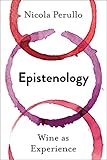Epistenology : Wine as Experience / Nicola Perullo.
Material type: TextSeries: Arts and Traditions of the Table: Perspectives on Culinary HistoryPublisher: New York, NY : Columbia University Press, [2020]Copyright date: ©2021Description: 1 online resourceContent type:
TextSeries: Arts and Traditions of the Table: Perspectives on Culinary HistoryPublisher: New York, NY : Columbia University Press, [2020]Copyright date: ©2021Description: 1 online resourceContent type: - 9780231552202
- 641.2/2 23
- online - DeGruyter
| Item type | Current library | Call number | URL | Status | Notes | Barcode | |
|---|---|---|---|---|---|---|---|
 eBook
eBook
|
Biblioteca "Angelicum" Pont. Univ. S.Tommaso d'Aquino Nuvola online | online - DeGruyter (Browse shelf(Opens below)) | Online access | Not for loan (Accesso limitato) | Accesso per gli utenti autorizzati / Access for authorized users | (dgr)9780231552202 |
Browsing Biblioteca "Angelicum" Pont. Univ. S.Tommaso d'Aquino shelves, Shelving location: Nuvola online Close shelf browser (Hides shelf browser)

|

|

|

|

|

|

|
||
| online - DeGruyter The Way Out : How to Overcome Toxic Polarization / | online - DeGruyter Designs on Empire : America's Rise to Power in the Age of European Imperialism / | online - DeGruyter Russian Energy Chains : The Remaking of Technopolitics from Siberia to Ukraine to the European Union / | online - DeGruyter Epistenology : Wine as Experience / | online - DeGruyter One Up : Creativity, Competition, and the Global Business of Video Games / | online - DeGruyter Land of Strangers : The Civilizing Project in Qing Central Asia / | online - DeGruyter The Diary of 1636 : The Second Manchu Invasion of Korea. |
Frontmatter -- CONTENTS -- NOTE FOR THE READER -- ACKNOWLEDGMENTS -- I WINE AND THE CREATIVITY OF TOUCH -- PROLOGUE -- 1 MEETING WITH WINE -- 2 HAPTIC TASTE -- 3 THE CREATIVITY OF TOUCH -- 4 THE LANGUAGES OF WINE, ALL OF THEM -- II TASTE AS A TASK -- 5 REESTABLISHING BONDS -- 6 WITHOUT A THEME -- 7 WITHOUT METHOD -- 8 WITHOUT COMPETENCY -- 9 WITHOUT JUDGMENT -- 10 TASTE IS NOT A SENSE BUT A TASK -- 11 STORIES WITHOUT INSTRUCTIONS -- 12 TERROIR IS THE WORLD -- 13 INEBRIATION AND INTOXICATION -- NOTES -- BIBLIOGRAPHICAL NOTE -- ESSENTIAL BIBLIOGRAPHY -- INDEX
restricted access online access with authorization star
http://purl.org/coar/access_right/c_16ec
We think we know how to appreciate wine—trained connoisseurs take dainty sips in sterile rooms and provide ratings based on objective knowledge and technical expertise. In Epistenology, Nicola Perullo vigorously challenges this approach, arguing that it is the enjoyment of drinking wine as an active and participatory experience that matters.Perullo argues that wine comes to life not in the abstract space of the professional tasting but in the real world of shared experiences; wines can change in these encounters, and drinkers along with them. Just as a winemaker is not simply a producer but a nurturer, a wine is fully known only through an encounter among a group of drinkers in a specific place and time. Wine is not an object to analyze but an experience to make, creatively opening up new perceptual possibilities for settings, cuisines, and companions.The result of more than twenty years of research and practical engagement, Epistenology presents a new paradigm for the enjoyment of wine and through it a philosophy based on participatory and relational knowledge. This model suggests a profound shift—not knowledge about but with wine. Interweaving philosophical arguments with personal reflections and literary examples, this book is a journey with wine that shows how it makes life more creative and free.
Mode of access: Internet via World Wide Web.
In English.
Description based on online resource; title from PDF title page (publisher's Web site, viewed 01. Dez 2022)


